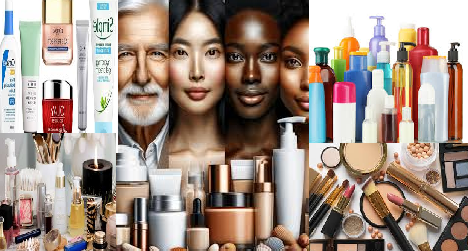Major Myths About Cosmetics and The Real Facts. Part #03

Major Myths About Cosmetics and The Real Facts.
#01. Myth:
Blackheads are caused by dirt and can be scrubbed away
Fact:
Blackheads may make skin look dirty, but they are unrelated to dirt.
- Blackheads are formed when hormones cause too much sebum (oil) production, dead skin cells get in the way, the pore is impaired or misshapen, and the path for the oil to exit through the pore is blocked, creating a clog.
- As this clog nears the surface of the skin, the mixture of oil and cellular debris oxidizes and turns, you guessed it, black.
- You cannot scrub away blackheads, at least not completely.
- Using a topical scrub removes the top portion of the blackhead, but does nothing to address the underlying cause, so they’re back again before too long.
- Instead of a scrub, try using a well-formulated BHA (salicylic acid) Salicylic acid exfoliates inside the pore lining, dissolving the oil and dead skin cells that lead to constant blackheads.
#02. Myth:
Oily skin can be controlled externally (from the outside in) with the right skin-care products.
Fact:
Possibly, but right now this is mere conjecture, involving an extremely complicated and difficult-to-understand process.
- Oil production is triggered primarily by androgens and estrogen (male and female hormones, respectively), and altering hormone production topically is not something available in the realm of cosmetics.
- However, the sebaceous gland itself also produces active androgens that can increase sebum excretion.
- What can happen is that stress-sensing skin signals (think skin inflammation and irritation) can lead to the production and release of androgens and cause more oil production, which can clog pores.
- These factors make topical irritation and inflammation bad for the skin, but that still doesn’t affect the production of hormones inside the body, the primary source for triggering the pore to make too much oil.
- What you can do is use a retinoid (vitamin A or tretinoin) to improve the shape of the pore so that the oil can flow more evenly, preventing clogging.
- There is some research that niacinamide in skin-care products can help, but no one is quite sure why.
- You also can avoid making matters worse by not using products that contain oils or thick emollient ingredients.
- You can absorb surface oil by using clay masks as part of your skin-care routine (though the effect is completely temporary), but you need to avoid masks that contain irritating ingredients.
- How often you should use a mask depends on your skin type; some people use one every day, others once a week.
- Masks of this kind may be used after cleansing, left on for 10–15 minutes, and then rinsed with tepid water.
#03. Myth:
Dry skin is caused by a lack of water, either by not having enough in the skin or simply not drinking enough water.
Fact:
Ironically, dry skin is not as simple as just a lack of moisture.
- The studies that have compared the water content of dry skin to that of normal or oily skin show that there doesn’t appear to be a statistically significant difference.
- Healthy skin requires a water content of about 15%, and adding too much moisture, like soaking in a bathtub, is bad for the skin because it disrupts the skin’s outer barrier (the intercellular matrix) by breaking down the substances that keep skin cells functioning normally and in good shape.
- What is thought to be taking place when dry skin occurs is that the intercellular matrix (the substances between skin cells that keep them intact, smooth, and healthy) has become depleted or damaged, bringing about a rough, uneven, and flaky texture that allows water to be lost.
- But adding water won’t keep that moisture in the skin unless the outer barrier is maintained or repaired, and again too much water just causes problems.
- To prevent dry skin, the primary goal is to avoid and reduce anything that damages the outer barrier, including sun damage, products that contain irritating ingredients, alcohol, drying cleansers, and smoking.
- All of the research about dry skin is related to the ingredients and treatments that reinforce the substances in the skin that keep it functioning normally.
- As for drinking lots of water each day (a beauty tip that refuses to fade away), if all it took to get rid of dry skin was to drink more water, then no one would have dry skin and moisturizers would stop being solid.
- Keeping your liquid intake up is fine, but if you take in more water than your body needs, all you will be doing is running to the bathroom all day and night.
- The causes of and treatments for dry skin are far more complicated than water consumption.
- If anything, though rare, drinking too much water can be dangerous, causing a potentially deadly condition called hyponatremia.
#04. Myth:
Dry skin causes wrinkles.
Fact:
Dry skin and wrinkles are not related.
- The inseparable association of dry skin with wrinkles continues to endure in the mind of the consumer.
- Nonetheless, the simple truth is that dry skin and wrinkles are not related in the least.
- I know that statement may be hard to accept because we’re so conditioned by advertising and product claims to think otherwise.
- But believing the myth can hurt your skin by inducing you to concentrate on treating your dry skin or loading up on moisturizers hoping it will get rid of wrinkles.
- It just doesn’t work that way.
- Abundant research has made it clear that wrinkles and dry skin are not related in terms of cause and effect.
- Extensive studies and analyses have shown that dry skin is frequently a by-product or result of other assaults on the skin that are the real cause of wrinkles.
- In other words, dry skin is primarily a symptom of other factors that cause wrinkles.
If dry skin doesn’t cause wrinkles, what does?
- Wrinkles are permanent lines etched into the skin from sun damage and internal causes (genetic changes, muscle movement, estrogen loss, and fat depletion).
- Nowhere, at least outside of ads and product claims, is dry skin ever mentioned as a cause of wrinkles.
- Sun damage is by far the most notable cause of wrinkling, which is easily proven by something referred to as the backside test of aging.
- In other words, compare the areas of your skin that rarely, if ever, see the sun with the parts of your body exposed to the sun daily.
- Those areas with minimal sun exposure (such as your backside) are rarely, if ever dry, and they also have minimal to no signs of wrinkles or aging skin.
- They will also have far more of the firmness, elasticity, and color of “younger” skin because they have not been subjected to years of cumulative exposure to sunlight.
#05. Myth:
Everyone needs a day cream and a night cream: Skin requires special care at night.
Fact:
The ONLY difference between daytime and nighttime moisturizers is that the daytime version should contain a well-formulated sunscreen.
- What you often hear cosmetics salespeople say is that the skin needs different ingredients at night than during the day.
- Yet there isn’t a shred of research or a list anywhere of what those ingredients or formulas should be.
- Skin is repairing itself and producing skin cells every nanosecond of the day and night.
- Helping skin do that in as healthy a manner as possible doesn’t change based on the time of day.
- Skin needs a generous amount of antioxidants, cell-communicating ingredients, and skin-identical ingredients all day and all night.
- Think about it like your diet: green tea, grapes, flax, and all the other aspects of healthy eating are good for you day or night.
- For daytime wear, unless your foundation contains an effective sunscreen, your moisturizer must feature a well-formulated, broad-spectrum sunscreen rated SPF 15 or higher.
- Well-formulated means that it contains UVA-protecting ingredients, specifically titanium dioxide, zinc oxide, avobenzone (also called butyl methoxydibenzoylmethane or Parasol 1789), Tinosorb, or Mexoryl SX (also called ecamsule).
- Regardless of the time of day, your skin needs all the current state-of-the- art ingredients it can get.
#06. Myth:
Your skin adapts to the skin-care products you are using and you need to change to new products now and then.
Fact:
Skin doesn’t adapt to skin-care products any more than your body adapts to a healthy diet.
- If spinach and grapes are healthy for you, they are always healthy, and they continue to be healthy, even if you eat them everyday.
- The same is true for your skin; as long as you are applying what is healthy for your skin it remains healthy.
- This is especially true for sunscreen and products that contain antioxidants, cell-communicating ingredients, and skin-identical ingredients.
#07. Myth:
I should just use what I like on my skin, that’s the most important thing.
Fact:
That would be a huge mistake because lots of women often like what isn’t good for them.
- For example, you may like getting a tan, but that can cause skin cancer and most certainly will cause wrinkles and skin discolorations.
- You may like smoking cigarettes, but that will cause skin cells to die and will cause the growth of unhealthy, malformed skin cells.
- You may like that daytime moisturizer you are using, but if it doesn’t contain sunscreen, it leaves your skin wide open to sun damage.
- Or you may prefer a moisturizer packaged in a jar, yet because almost all of the important state-of-the-art ingredients, especially antioxidants, plant extracts, vitamins, and cell-communicating ingredients, deteriorate in the presence of air, the jar packaging will not keep these ingredients stable, so you would be short-changing your skin soon after the product is opened.
- What it takes to help your skin be at its best and to function normally and fight wrinkles acne or any other skin problem is far more complex than just using what you “like.”
- This doesn’t mean that you shouldn’t like what you use but do take the time to select products that are truly healthy and beneficial for your skin.
- That is, take the time to read the ingredient list and consult reliable reviews of the products you’re considering, because you can’t determine the benefits intuitively.
- Think of it like your diet.
- If you were given the choice between eating what you like, say chocolate cake versus spinach and broccoli, you would eat a lot more chocolate cake than any green vegetable.
- But we eat the green veggies not so much because we like them but because we have learned they are better for us.
- It’s impossible to accurately judge effectiveness and value based just on how you feel about the product.
#08. Myth:
You should buy all your skin-care products from one cosmetic brand because the products are designed to work together.
Fact:
That may be good for the company’s sales, but it doesn’t help your skin and, in many cases, will only end up causing problems.
- Almost every skin-care line in the world has good and bad products or products that are inappropriate for special skin-care concerns.
- Lots of companies may have products containing problematic ingredients, some because they use irritating ingredients or ingredients that can’t remotely live up to their claims, others because of what they don’t contain such as effective sun protection or products in stable packaging.
- Much like shopping for food, you have to pick and choose what works and an entire line may not be suited to meet that need.
#09. Myth:
If it tingles or feels cooling on my skin it must be doing something.
Fact:
Any noticeable sensation, even for a brief period, is almost always damaging to your skin.
- That familiar tingling, cooling sensation is just your skin responding to irritation, resulting in inflammation.
- Products that produce that sensation can damage your skin’s healing process; make scarring worse; cause collagen and elastin to break down; cause dry, flaky skin; and increase the growth of bacteria that cause pimples.
- Inflammation is the real culprit responsible for wrinkles and skin aging.
- Whether the inflammation in the skin is brought about by the sun, smoking, pollution, or irritating ingredients used on the skin, the resulting reaction generates unpleasant and undesirable side effects ranging from dry, itchy skin to acne; reduced ability for the skin to heal; and collagen destruction.
- When the skin is irritated from almost any source you end up hurting your skin, not helping it.
- A tingling or cooling sensation is a signal that your skin is being irritated and inflamed.
- It is being caused by problematic skin-care ingredients that can include overly abrasive cleansers, alcohol, fragrant plant extracts, peppermint, menthol, eucalyptus, and on and on, and their continued use will greatly reduce your chances of having the kind of skin you want.
There are times when cooling ingredients are helpful.
- Ingredients such as menthol, peppermint, camphor, and mint are counter-irritants.
- Counter-irritants are used to induce local inflammation to reduce inflammation in deeper or adjacent tissues.
- In other words, they substitute one kind of inflammation for another, which is never good for the skin, but can provide relief when itching is a temporary nuisance not abated by gentle scratching.
- Irritation or inflammation, no matter what causes it or how it happens, impairs the skin’s immune and healing response.
- And although your skin may not show it or doesn’t react in an irritated fashion, if you apply irritants to your skin the damage is still taking place and is ongoing, so it adds up over time.
#10. Myth:
The product I’m using contains ingredients that are known to irritate the skin, like alcohol, lavender, bergamot, and peppermint, but I don’t feel anything, so those ingredients aren’t a problem for me.
Fact:
Even though you don’t feel a substance reacting on your skin, that doesn’t mean it isn’t doing damage.
- For example, we don’t feel the UVA rays of the sun.
- We can be sitting in the shade or inside next to a window and the sun’s UVA rays are penetrating through, reaching our skin, and causing serious, cumulative damage.
- Whether or not your skin reacts in the short term doesn’t mean the damage isn’t happening beneath the surface, which is why it is so important to always treat your skin gently.
- Irritating, drying, and sensitizing ingredients cause problems underneath the skin that will take a toll in the long run, whether your skin shows it or not.
#11. Myth:
My grandmother or mother had (has) beautiful skin so I just use what they’ve always used.
Fact:
While your lineage may include naturally perfect skin, using skin-care products formulated even more than ten years ago would be a mistake.
- It would be similar to saying, my grandmother was a great writer or researcher so I’m going to use the same typewriter or computer they used.
- No one is going to use a computer for more than five years any more than they would use a typewriter and still be as productive as they would be using a current state-of-the-art computer.
- The same is true for skin-care products.
- What we know nowadays about formulations, ingredients, how skin functions at its best, sun damage, exfoliation, healing, and on and on is rarely addressed in products developed before the millennium.
- The brilliant advances in cosmetic chemistry, dermatology, and ingredient technology now allow for the creation of all types of products that have elegant textures, silky applications, superb finishes, and truly effective ingredients that can make a difference in every aspect of your skin-care needs.
- There are many excellent things to emulate about your grandmother or mother, but the skin-care products they used in the past shouldn’t be one of them.






